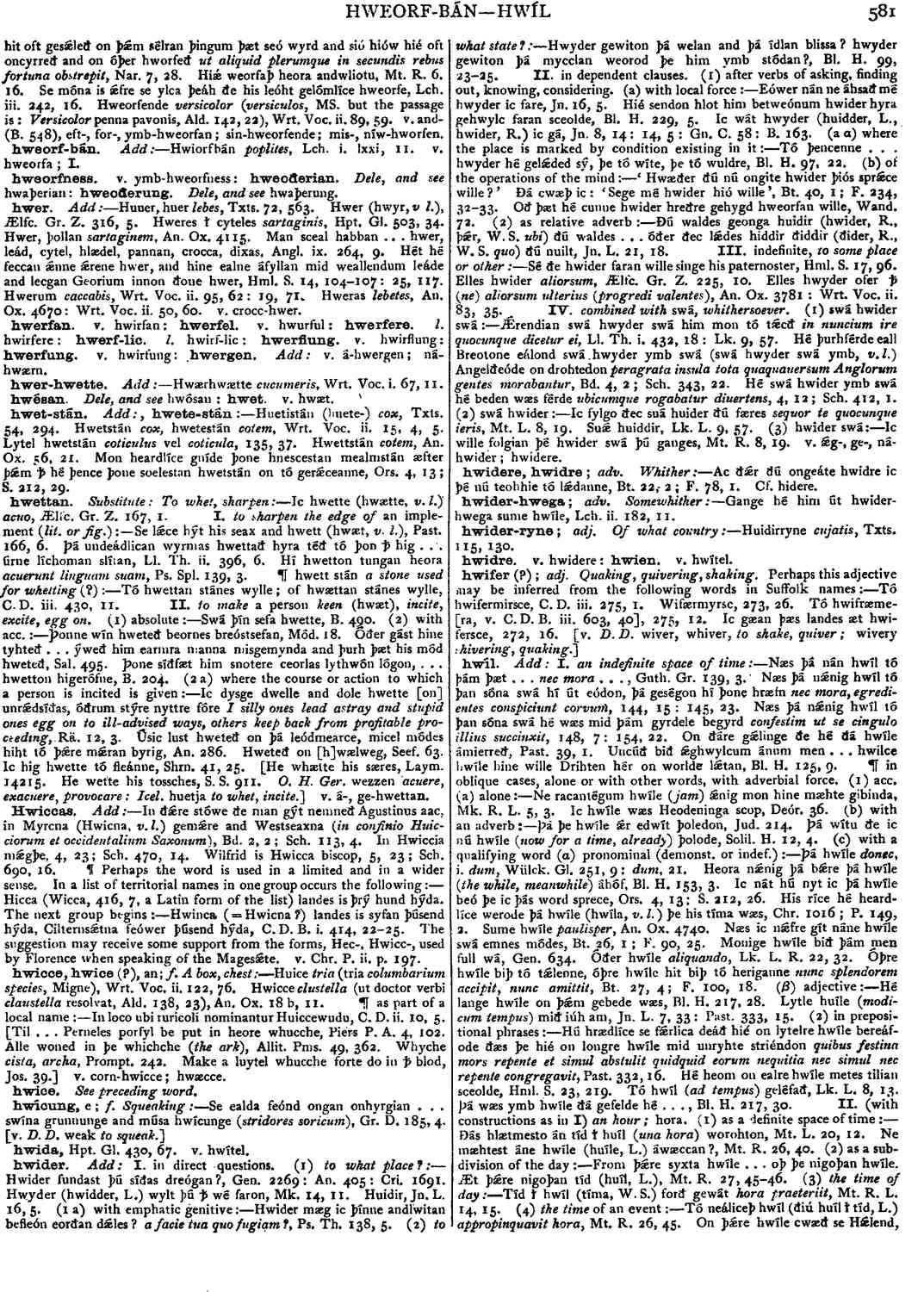hwider
-
Hwider fundast þú síðas dreógan?,
- Gen. 2269: An. 405: Cri. 1691.
-
Hwyder (hwidder, L.) wylt þú ꝥ wé faron, Mk. 14, II. Huidir, Jn. L. 16, 5. (l a) with emphatic genitive :-- Hwider mæg ic þínne andlwitan befleón eorðan dǽles?
a facie tua quo fugiqm?
,- Ps. Th. 138, 5.
-
Hwyder gewiton þá welan and þá ídlan blissa ? hwyder gewiton þá mycclan weorod þe him ymb stódan ?,
- Bl. H. 99, 23-25.
-
Eówer nán ne ábsað mé hwyder ic fare,
- Jn. 16, 5.
-
Hié sendon hlot him betweónum hwider hyra gehwylc faran sceolde,
- Bl. H. 229, 5.
-
Ic wát hwyder (huidder,
- L. , hwider, R.) ic gá, Jn. 8, 14: 14, 5 : Gn. C. 58 : B. 163. (a α)
-
' Hwæðer ðú nú ongite hwider þiós sprǽce wille ? ' Ðá cwæþ ic: ' Sege mé hwider hió wille',
- Bt. 40, l; F. 234, 32-33.
-
Oð þæt hé cunne hwider hreðre gehygd hweorfan wille,
- Wand. 72.
-
Ðú waldes geonga huidir (hwider, R. , þǽr, W. S.
ubi) ðú waldes . . . óðer ðec lǽdes hiddir ðiddir (ðider, R. , W. S. quo )
ðú nuilt,- Jn. L. 21, 18.
-
Sé ðe hwider faran wille singe his paternoster,
- Hml. S. 17, 96.
-
Elles hwider
aliorsum
,- Ælfc. Gr. Z. 225, 10.
-
Elles hwyder ofer ꝥ (
ne) aliorsum ulterius (progredi valentes ),
- An. Ox. 3781 : Wrt. Voc. ii. 83; 35.
-
Ǽrendian swá hwyder swá him mon tó tǽcð
in nuncium ire quocunque dicetur ei
,- Ll. Th. i. 432, 18 : Lk. 9, 57.
-
Hé þurhférde eall Breotone eálond swá hwyder ymb swá (swá hwyder swá ymb, v. l.) Angelðeóde on drohtedon
peragrata insula tota quaquauersum Anglorum gentes morabantur
,- Bd. 4, 2 ; Sch. 343, 22.
-
Hé swá hwider ymb swá hé beden wæs férde
ubicumque rogabatur diuertens
,- 4, 12; Sch. 412, I.
-
Ic fylgo ðec suá huider ðú færes
sequor te quocunque ieris.
- Mt. L. 8, 19.
-
Suǽhuiddir,
- Lk. L. 9, 57.
-
Ic wille folgian þé hwider swá þú ganges,
- Mt. R. 8, 19.
Bosworth, Joseph. “hwider.” In An Anglo-Saxon Dictionary Online, edited by Thomas Northcote Toller, Christ Sean, and Ondřej Tichy. Prague: Faculty of Arts, Charles University, 2014. https://bosworthtoller.com/53569.
Checked: 0